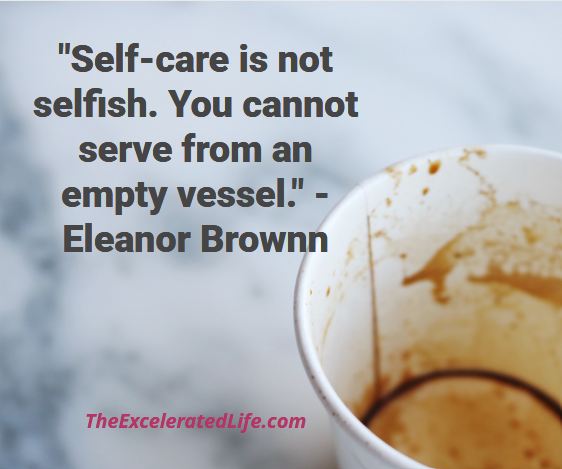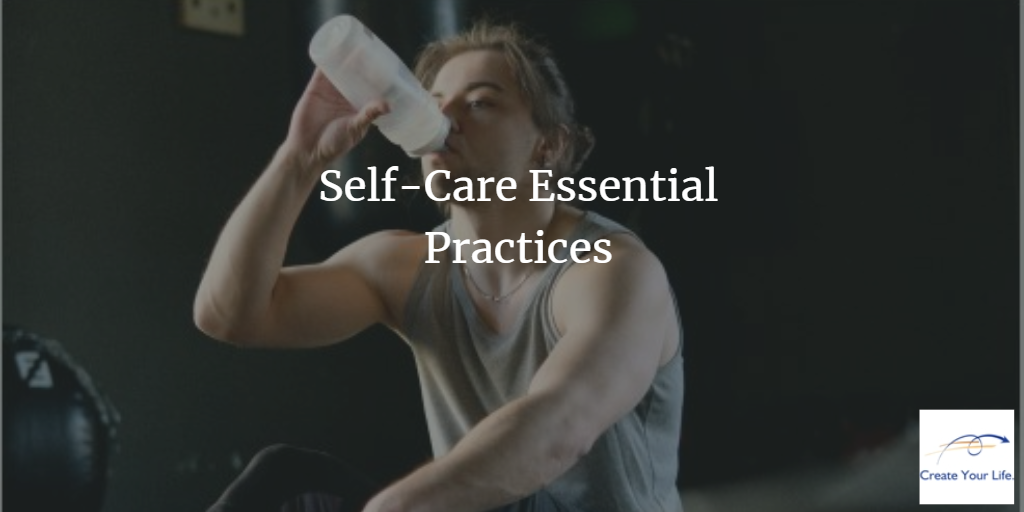When we neglect our own needs and fail to take care of ourselves, we risk burnout, decreased productivity, and compromised overall well-being. When we invest time and effort in self-care essential practices, we can maintain a healthier and more fulfilling life in the long run.
The Need for Self-Care
Jimmy and Timmy were best friends. They’d grown up together on the same block, had gone to school together, and even had similar jobs within the same company. You’d think they’d be very much alike in their habits, right? But there you’d be wrong.
Sadly, Jimmy has never learned to take care of himself. To get ahead at work, he pushes himself to work long hours. To save time, he skips meals or grabs a fast food takeout. He never takes time to exercise and sacrifices sleep in order to meet work deadlines. And Jimmy gives up time with his family in order to get more work done.
Timmy on the other hand knows the importance of taking good care of his most important asset – his health. He regularly takes time off. He exercises consistently and makes the effort to eat healthily. He nurtures his relationships and spends good quality and quantity time with those he loves.
At first, there is little difference in the lives and work of Jimmy and Timmy. But as time goes by, the difference in their self-care habits – and lack of them – become readily apparent.
Jimmy’s performance at work begins to slip. He feels physically exhausted much of the time. His mental faculty has lost its sharpness and he feels flat and emotionally overwhelmed. He is facing burnout and it is evident to all those around him. There is a promotion opening up at work but his boss doesn’t even consider Jimmy as a prospect. At home, he is irritable and is slowly pushing his family away.
Timmy’s life could not be more different. He performs consistently with high energy. His focus is sharp and he is able to bounce back quickly when faced with a challenge. In fact, he is being seriously considered for the promotion at work and the boss plans to meet with him in a couple of days to make the offer. At home, Timmy is open and loving and the relationships with his family are growing deeper.
Two friends who started out much the same, with similar backgrounds. Yet look what a difference properly caring for yourself makes. Self-care is not a luxury; it’s a necessity. When we neglect our own needs and fail to take care of ourselves, we risk burnout, decreased productivity, and compromised overall well-being. On the other hand, by investing time and effort in self-care essential practices, we can maintain a healthier and more fulfilling life in the long run.
Intro to Self-Care
For our discussion, let’s define self-care as the deliberate and intentional practice of taking care of our physical, emotional, mental, and social well-being. It involves engaging in activities and behaviors that promote self-nourishment, rejuvenation, and overall personal growth. Self-care is about recognizing and honoring one’s needs, setting boundaries, and prioritizing our own health and happiness. It includes a range of basic daily habits aimed at maintaining balance, reducing stress, and fostering a sense of well-being. We do this with the end result in mind of being able to give our best in Service to the world.
Self-care is all about the everyday habits that help you take care of your health and nurture your well-being. To be your best you must take care of your physical, mental, and emotional health.
And just as it is necessary to nurture your relationships well before you need them, you must start your self-care program while you are still healthy, not after you get sick. Eating a healthy diet, getting sufficient sleep, moving your body, handling stress, and taking time for yourself help you maintain good health and resiliency, and lead to well-being.
Seven Self-care Essential Practices
Here are seven practices that you can do to improve self-care.
- Establish a daily self-care routine. Create a daily routine that includes specific self-care activities. This can be as simple as setting aside time for meditation, journaling, or engaging in a hobby you enjoy. Consistency is key to reaping the benefits of self-care.
- Prioritize your physical health. Take care of your body by engaging in regular exercise that you enjoy. Find activities that suit your preferences, such as walking, yoga, swimming, or dancing. Additionally, focus on consuming a balanced diet with plenty of fruits, vegetables, whole grains, and lean proteins.
- Practice mindfulness and relaxation techniques. Incorporate mindfulness practices into your daily life to reduce stress and promote emotional well-being. This can include deep breathing exercises, meditation, progressive muscle relaxation, or engaging in activities like yoga or tai chi chih.
- Set boundaries. Learn to set clear boundaries with others to protect your time, energy, and emotional well-being. Say no to commitments that don’t align with your priorities, and communicate your needs effectively to maintain healthy relationships and avoid burnout.
- Foster healthy relationships. Cultivate positive and supportive relationships in your life. Surround yourself with people who uplift and inspire you. Make time for meaningful connections by spending quality time with loved ones or joining social groups.
- Engage in activities that bring you joy. Identify activities that bring you joy and make time for them regularly. This could include hobbies, creative pursuits, spending time in nature, reading, listening to music, or engaging in any activity that nourishes your soul and brings you happiness.
- Practice self-compassion. Be kind to yourself and practice self-compassion. Treat yourself with the same kindness, understanding, and forgiveness that you would extend to a loved one. Practice positive self-talk, acknowledge your achievements, and embrace self-care as an essential part of your well-being.
Remember, self-care is unique to each individual, so feel free to customize these practices to fit your own needs and preferences.

You Practicing Self-Care, an Example
Let’s imagine for a moment how it is when you follow self-care essential practices.
You are a working professional, a spouse, a parent, a leader in your church or other organization, a friend, a sibling, and a child. Because of all your roles, you lead a busy and demanding life. Yet despite your hectic schedule, you understand the importance of self-care and you made it a priority in your daily routine.
For physical self-care, you work to maintain a healthy diet through meal planning and by incorporating nutritious meals into your schedule. You prioritize regular exercise and enjoy going for a walk in the morning or attending fitness classes a few times a week. Additionally, you make it a point to get seven to eight hours of sleep each night, recognizing the vital role it plays in your overall well-being.
Emotional self-care is also crucial, so you practice mindfulness and meditation daily, taking a few minutes each morning to breathe deeply and center yourself. Whenever you feel overwhelmed, you engage in an activity that brings you joy and relaxation, such as reading a book, painting, or taking a soothing bath.
To take care of your mental well-being, you set realistic goals and you prioritize effectively. You manage your time to avoid feeling overwhelmed. You practice self-compassion by acknowledging when you do well and by not being too hard on yourself when things don’t go as planned.
Finally, you pay attention to your environment. You keep your living space clean, organized, and filled with elements that bring you joy and inspiration. You spend time in nature, whether it’s going for walks in the park or hiking on weekends, to connect with the natural world and find solace.
Through this consistent practice of self-care, you experience improved physical health, emotional well-being, mental clarity, and a sense of fulfillment in your life.
Now, I have no way of knowing how accurately this describes your life now – perhaps quite a bit, perhaps not at all. But I hope it opens you to the knowledge of how prioritizing self-care can lead to a balanced and fulfilling lifestyle.
Actions
Now, here are some specific actions you can take to improve your self-care.
- Set clear boundaries. One important action you can take is to set clear boundaries in your personal and professional life. This means learning to say no to commitments that overwhelm you or don’t align with your priorities. It also involves identifying and communicating your needs to others, whether it’s asking for help, delegating tasks, or carving out dedicated time for yourself. Setting boundaries allows you to protect your time, energy, and overall well-being. It’s a foundational move for beginning to incorporate other self-care essential practices.
- Practice regular exercise. Engaging in regular physical activity is another key action for improving self-care. Find an exercise routine that suits your preferences and fits into your lifestyle. It could be going for a walk or run, attending fitness classes, practicing yoga, or any form of exercise that you enjoy. Regular exercise not only improves your physical health but also boosts your mood, reduces stress, and enhances overall well-being.
- Prioritize time for self-reflection and relaxation. Make it a habit to allocate time for self-reflection and relaxation. This can involve practices such as meditation, mindfulness exercises, deep breathing techniques, or journaling. Set aside a few minutes each day to check in with yourself, identify your emotions, and practice self-awareness. Additionally, incorporate activities that help you relax and recharge, such as taking a warm bath, reading a book, listening to calming music, or spending time in nature. Prioritizing these moments of self-reflection and relaxation allows you to rejuvenate and maintain a balanced state of mind.
By taking these specific actions – setting boundaries, engaging in regular exercise, and prioritizing self-reflection and relaxation – you can make significant strides in improving your self-care and overall well-being. Remember, self-care is a continuous practice, and finding what works best for you is key.
Engage in Self-Care Essential Practices
Remember, self-care is not selfish. It is an essential practice for taking care of yourself. It recognizes that in order to effectively care for others or fulfill our responsibilities, we must first ensure our own well-being. Just as we cannot pour from an empty cup, we cannot give our best if we neglect our own needs. Prioritizing self-care allows us to replenish, recharge, and show up in a healthier and more balanced way for ourselves and those around us. And engaging in the fundamentals of self-care practice is one step in embracing your Excelerated Life™!
Review the list of self-care essential practices. What is the one practice that you would find most beneficial?
How could you begin that practice today?
Share your comments by leaving a post below.
Excelerated Fundamentals™ — perfecting basic self-care practices — is one step in creating your Excelerated Life™, a life of flourishing and well-being, and a life of meaning, purpose, and service.


